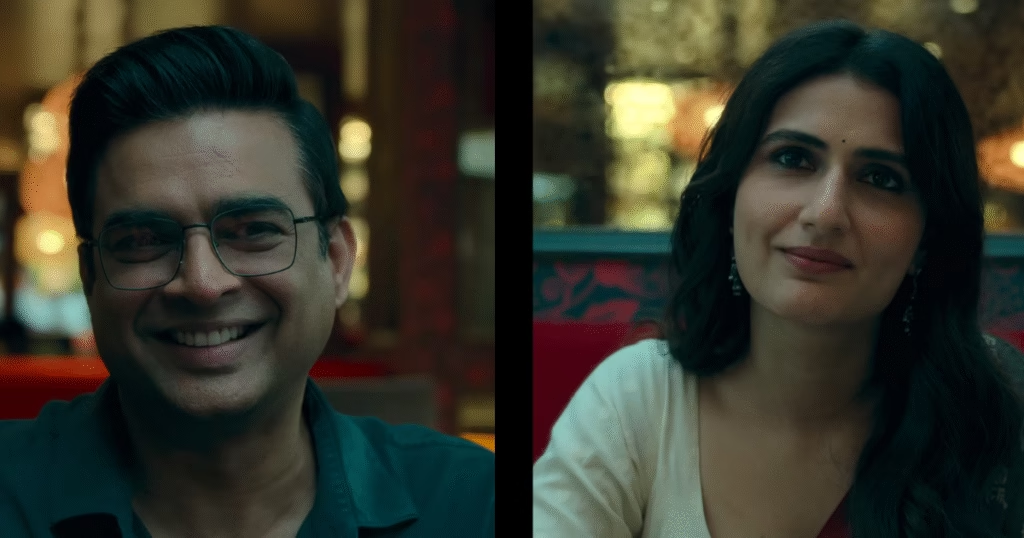A Mature Romance Daring to Ask Difficult Questions
In Aap Jaisa Koi, director Vivek Soni attempts a rare feat in contemporary Hindi cinema — to craft a romantic dramedy between two adults from wildly different worlds and generations. Starring R. Madhavan as a 42-year-old Sanskrit teacher and Fatima Sana Shaikh as a spirited French instructor from Kolkata, this Netflix romcom aims to explore love beyond age, societal expectations, and gender roles.
With Dharma Productions behind it and a charming premise, the film initially sparkles with promise. But while its heart is in the right place, Aap Jaisa Koi struggles with tonal imbalance and shallow writing that prevents it from achieving the emotional depth it aspires to.
Performances: Charming, But Not Always Convincing
R. Madhavan Finds Comfort in Uncomfortable Territory
R. Madhavan, playing the timid and awkward Shrirenu Tripathi, delivers a performance that straddles sincerity and stiffness. He plays the repressed bachelor with enough vulnerability to be relatable, especially when grappling with the realization that even “nice guys” can harbor deeply embedded patriarchy.
His character arc — from shy romantic to regressive traditionalist — feels believable in patches, but the transition isn’t written with enough finesse to fully resonate.

Fatima Sana Shaikh Tries to Soar But Struggles with Depth
As Madhu Bose, Fatima brings flair and warmth to the screen. She’s vibrant and grounded, especially in the film’s lighter moments. However, her performance falters when the script demands emotional complexity — her Bengali identity feels more curated than lived-in, and her chemistry with Madhavan lacks the crackle that could’ve elevated this offbeat romance.
A Tale of Two Families, Two Cultures — But Too Many Ideas
At its core, Aap Jaisa Koi is a story of contrasts: age, language, region, and ideology. The film places the conservative Tripathis of Jamshedpur against the liberal, bohemian Boses of Kolkata, using them to mirror the internal conflict within Shrirenu.
This dichotomy creates room for some sharp commentary on modern love, gender roles, and societal hypocrisy — especially in scenes where Madhu’s independence is questioned and Shrirenu’s masculinity is threatened. The line “Everything is fine, but you need to stay within your limits” is one of the film’s more chilling moments, a slap-in-the-face reminder that even the quietest men can weaponize patriarchy.
But where the film falters is in its ambition. Instead of zooming in on the relationship at its center, it dilutes its emotional power by juggling too many subplots — a rebellious niece, a frustrated housewife, a philosophical friend, and a parade of clichés. These threads are interesting on their own but are too hurriedly resolved to feel satisfying.
Visuals, Music & Nostalgia: An Aesthetic Experience
Aap Jaisa Koi scores high on aesthetics. The visuals of Kolkata, especially during the monsoon, are tender and atmospheric. The scenes at College Street’s Coffee House, riverside walks, and old film screenings evoke a gentle, almost postcard-like nostalgia.
The soundtrack — soft, melodic, and unobtrusive — complements the mood well, although none of the songs quite leave a lasting impact. Bollywood homage is sprinkled throughout — from Kuch Kuch Hota Hai to Chalti Ka Naam Gaadi — but it sometimes feels more like an imitation of warmth than an organic tribute.
Final Verdict: ★★★☆☆ (3/5 stars). A Gentle Film That Needed More Courage
Aap Jaisa Koi is sincere, aesthetically pleasant, and intermittently thought-provoking. But it ultimately plays it too safe. The film’s best moments lie in the subtle exchanges between two lonely people daring to be vulnerable. However, the script’s tendency to over-explain and underdevelop key ideas leaves the romance feeling undercooked.
Still, for those craving a romcom that at least attempts to go beyond the surface, this one is worth a watch — even if you leave wishing it had done more with the material it had.
Aap Jaisa Koi is currently streaming on Netflix.

